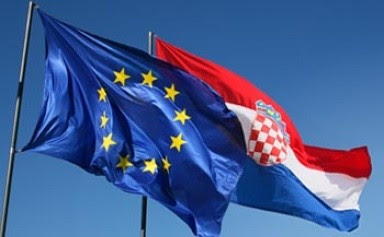Today Croatia became the 28th member of the European Union. After a long (12 year) EU accession process, after undergoing rigorous scrutiny (EC became careful after Bulgaria and Romania), a couple of corruption scandals, border issues with Slovenia and some attempts to strengthen domestic institutions, the European Commission has declared Croatia fit to join the EU.
The media across the globe has followed the story; the comments range from optimistic, realistic to pessimistic (see Reuters, New York Times, BBC, Financial Times, the Economist, WSJ, Guardian, Deutsche Welle, etc.).
I have been asked on several occasions to comment on how the EU accession will impact Croatia, most recently by Neil Buckley of the Financial Times (in addition here is a text from an Irish journalist who quotes me as Dr Vuković - that's very nice of him). This is more or less what I've told the reporters:
For a small open economy like Croatia the initial effect of EU accession will be significant, of course depending on the industry. For all those industries which haven't been able to adapt to the new market entry (via forming export clusters for example) will experience great difficulties and most likely go under. A decade long dependence on political concessions will hardly be helpful once the external competition enters the domestic market more strongly. On the other hand there is a possibility that the new increased competition from the EU will encourage new innovative solutions among Croatian entrepreneurs and thus contribute to more wealth creation. However, this is only possible if the domestic institutional system would encourage innovation and entrepreneurial incentives, and not discourage them by a huge number or regulatory and fiscal constraints or an inefficient bureaucracy (as was the case so far). It will be interesting to see how the EU bureaucratic apparatus will function in Croatia; will it add to the domestic woes or will it make things more efficient (a bit unlikely isn't it)?
Secondly, the EU accession could paradoxically help Croatia's labour market situation by emulating the Polish effect. Since entering the EU almost 500,000 Polish citizens have emigrated to the UK, generally taking lower-paid jobs. The effect for the Polish economy was lower unemployment and lower pressure on its public finances, but also a significant increase of remittances being sent back home. (Croatia already experienced a similar scenario in the 70-ies when a lot of domestic labour emigrated to West Germany - these remittances have helped many families survive at the time). Such a scenario would imply a negative effect on the already poor domestic demographic picture, but it will be hard to avoid it since our governments haven't done much so far to maintain the educated and productive work force in Croatia.
The only difference between 2004 and today is the poor labour market situation across Europe. This may after all keep the people at bay.
With regards to domestic aspirations, the people in general tend to feel that the EU will be helpful in terms of greater transparency and further fight against corruption. It was the pressure of EU negotiations that have forced governments to battle against huge domestic corruption scandals (most of them revolving around the ex PM Sanader and his party). Without outside pressure, the people feel this would have never been revealed.
Another thing almost everyone is looking forward to is using the money from EU structural funds. People like to stress out that we need to emulate the cases of Ireland, Poland or Estonia and how they have managed efficiently and effectively to use the EU funds into helping their domestic economies. So far, some funds have been allocated efficiently, but the general perception is that more needs to be done.
